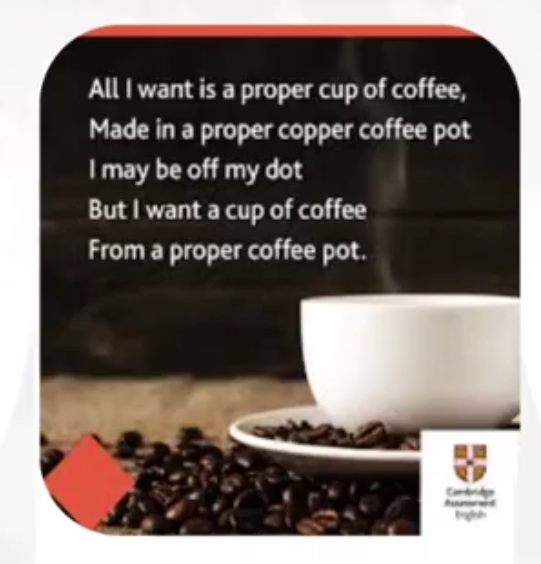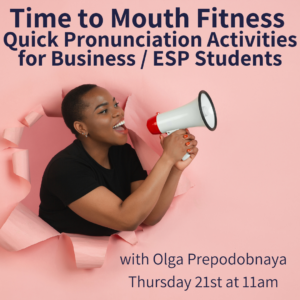I love a bit of phonology, so it was great to have another webinar on the topic. If you’re a fan of phonology too, you can also check out Lina Gordyshevkaya’s session on The Essentials of Teaching Pronunciation. Olga’s ideas are aimed at those in Business English, but easily adaptable to any context.
Olga noted that a lot of her learners shy away from pronunciation activities, imagining boring drilling activities. However, when they hear the word fitness, they feel more relaxed and so she decided to make the most of this and do mouth fitness with them. She talked about her teaching experience, often working with high-level businesspeople who may feel embarrassed by the idea of doing tongue twisters or other activities which may be seen as ‘silly’ if they can’t see the rationale behind them. She googled some more realistic tongue twisters than Peter Piper and discovered this one:

She identified some reasons why people might want to work on their pronunciation: to improve their motivation and boost their confidence and to increase their level of understanding of segmental and suprasegmental features of English. She went on to clarify what we mean by understanding: intelligibility, comprehensibility and interpretability (Smith, 1992), as well as Derwing and Munro‘s work on accentedness.
We also chatted a little about how learners can sometimes struggle to understand other learners speaking English if they come from a different L1 background.
Olga went on to look at some common words and phrases which can sometimes cause problems for her learners, such as the /w/ and /v/ in very well for Russian speakers or the number of syllables and stress pattern in vegetable or comfortable (although listen to one of The Hairy Bikers say vegetables). She also looked at some more business-specific language, such as expenditure or report.
An idea which Olga shared was how she adapted the SWOT analysis to work on her learners’ common pronunciation errors: (S) syllable added, (W) word stress and also /w/ and /v/, (O) the /əʊ/ problem and (T) the /tʃə/ problem. She also shared some tongue twisters she had prepared for her learners:
- /ks/: A successful dentist accepts credit cards except American Express.
- /w/ and /v/: When Valerio verifies vouchers in Verona, we will withdraw Venezuelan bolivars.
- /əʊ/: Coaches coach only coachable coachees.
- /tʃə/: Every culture has a different structure.
As she noted, quoting Underhill, pronunciation is about physicality so if we can our learners’ mouths used to producing different sounds, they will have better muscle memory through constant practice.
She also noted another problem which learners sometimes have distinguishing between Tuesday and Thursday (which reminded me of this clip from Friends). Olga’s adaptation was Tuesday (TWOsday) and Thursday (FOURsday), which though not entirely accurate, makes the distinction clearer, particularly if you’re trying to schedule lessons over the phone.
She ended with another adaptation of the SWOT model:
- S – see what they lack
- W – work on their ‘issues’ regularly
- O – optimize their routine by personalisation
- T – track their progress by recording

1 thought on “Time to Mouth Fitness – with Olga Prepodobnaya”